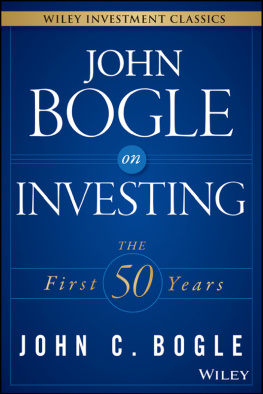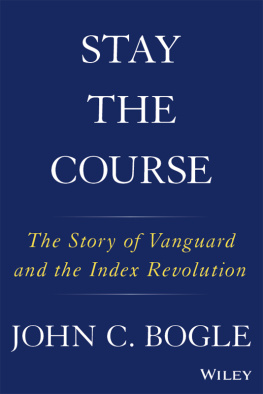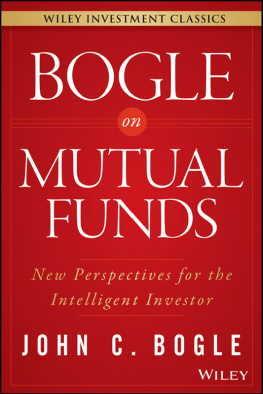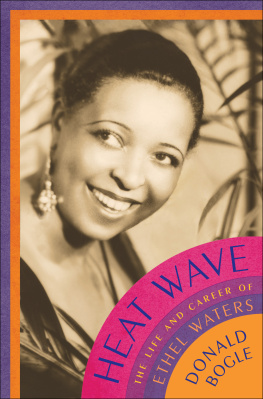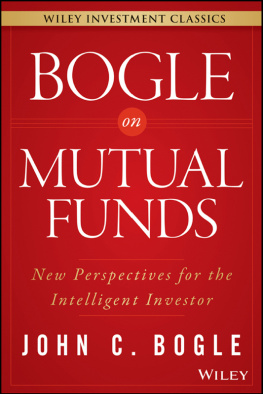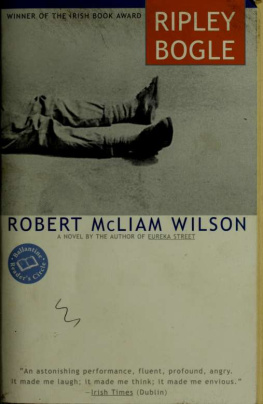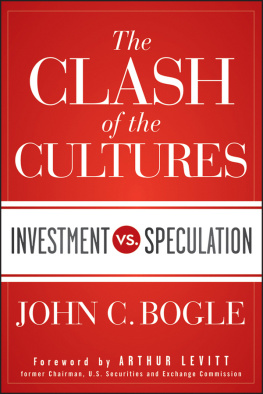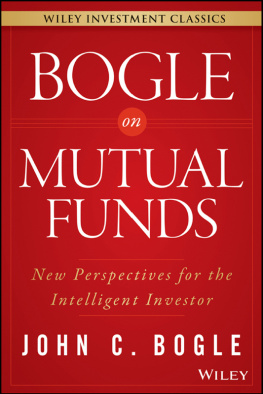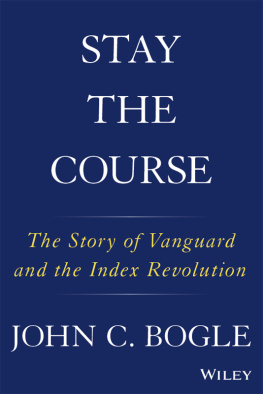Bogle - John Bogle on investing the first 50 years
Here you can read online Bogle - John Bogle on investing the first 50 years full text of the book (entire story) in english for free. Download pdf and epub, get meaning, cover and reviews about this ebook. year: 2015, publisher: Wiley, genre: Romance novel. Description of the work, (preface) as well as reviews are available. Best literature library LitArk.com created for fans of good reading and offers a wide selection of genres:
Romance novel
Science fiction
Adventure
Detective
Science
History
Home and family
Prose
Art
Politics
Computer
Non-fiction
Religion
Business
Children
Humor
Choose a favorite category and find really read worthwhile books. Enjoy immersion in the world of imagination, feel the emotions of the characters or learn something new for yourself, make an fascinating discovery.
- Book:John Bogle on investing the first 50 years
- Author:
- Publisher:Wiley
- Genre:
- Year:2015
- Rating:4 / 5
- Favourites:Add to favourites
- Your mark:
- 80
- 1
- 2
- 3
- 4
- 5
John Bogle on investing the first 50 years: summary, description and annotation
We offer to read an annotation, description, summary or preface (depends on what the author of the book "John Bogle on investing the first 50 years" wrote himself). If you haven't found the necessary information about the book — write in the comments, we will try to find it.
John Bogle on investing the first 50 years — read online for free the complete book (whole text) full work
Below is the text of the book, divided by pages. System saving the place of the last page read, allows you to conveniently read the book "John Bogle on investing the first 50 years" online for free, without having to search again every time where you left off. Put a bookmark, and you can go to the page where you finished reading at any time.
Font size:
Interval:
Bookmark:

There are certain books that have redefined the way we see the worlds of finance and investingbooks that deserve a place on every investor's shelf. Wiley Investment Classics will introduce you to these memorable books, which are just as relevant and vital today as when they were first published. Open a Wiley Investment Classic and rediscover the proven strategies, market philosophies, and definitive techniques that continue to stand the test of time.
Books in the series include:
Only Yesterday: An Informal History of the 1920's by Frederick Lewis Allen
Lombard Street: A Description of the Money Market by Walter Bagehot
The Go-Go Years: The Drama and Crashing Finale of Wall Street's Bullish 60s by John Brooks
Fifty Years in Wall Street by Henry Clews
Value Averaging: The Safe and Easy Strategy for Higher Investment Returns by Michael E. Edleson
Common Stocks and Uncommon Profits and Other Writings by Philip A. Fisher
Paths to Wealth through Common Stocks by Philip A. Fisher
Extraordinary Popular Delusions and the Madness of Crowds by Charles Mackay and Confusion de Confusines by Joseph de la Vega by Martin S. Fridson, Ed.
Where the Money Grows and Anatomy of the Bubble by Garet Garrett
The Stock Market Barometer by William Peter Hamilton
Manias, Panics, and Crashes: A History of Financial Crises by Charles P. Kindleberger and Robert Aliber
Reminiscences of a Stock Operator by Edwin Lefvre
The Battle for Investment Survival by Gerald M. Loeb
A Fool and His Money: The Odyssey of an Average Investor by John Rothchild
The Common Sense of Money and Investments by Merryle Stanley Rukeyser
Where Are the Customers' Yachts? or A Good Hard Look at Wall Street by Fred Schwed, Jr.
The Alchemy of Finance by George Soros
The Aggressive Conservative Investor by Martin J. Whitman and Martin Shubik
Supermoney by Adam Smith
Bogle on Mutual Funds: New Perspectives for the Intelligent Investor by John C. Bogle
John Bogle on Investing: The First 50 Years by John C. Bogle
John C. Bogle

Cover design: Wiley
Copyright 2015 by John C. Bogle. All rights reserved.
Published by John Wiley & Sons, Inc., Hoboken, New Jersey.
The first edition paperback edition of this book was published by McGraw-Hill 2001.
Chapter 8, Selecting Equity Mutual Funds, is reprinted with permission of Institutional Investor, Inc.
Published simultaneously in Canada.
No part of this publication may be reproduced, stored in a retrieval system, or transmitted in any form or by any means, electronic, mechanical, photocopying, recording, scanning, or otherwise, except as permitted under Section 107 or 108 of the 1976 United States Copyright Act, without either the prior written permission of the Publisher, or authorization through payment of the appropriate per-copy fee to the Copyright Clearance Center, Inc., 222 Rosewood Drive, Danvers, MA 01923, (978) 750-8400, fax (978) 646-8600, or on the Web at www.copyright.com. Requests to the Publisher for permission should be addressed to the Permissions Department, John Wiley & Sons, Inc., 111 River Street, Hoboken, NJ 07030, (201) 748-6011, fax (201) 748-6008, or online at http://www.wiley.com/go/permissions.
Limit of Liability/Disclaimer of Warranty: While the publisher and author have used their best efforts in preparing this book, they make no representations or warranties with respect to the accuracy or completeness of the contents of this book and specifically disclaim any implied warranties of merchantability or fitness for a particular purpose. No warranty may be created or extended by sales representatives or written sales materials. The advice and strategies contained herein may not be suitable for your situation. You should consult with a professional where appropriate. Neither the publisher nor author shall be liable for any loss of profit or any other commercial damages, including but not limited to special, incidental, consequential, or other damages.
For general information on our other products and services or for technical support, please contact our Customer Care Department within the United States at (800) 762-2974, outside the United States at (317) 572-3993 or fax (317) 572-4002.
Wiley publishes in a variety of print and electronic formats and by print-on-demand. Some material included with standard print versions of this book may not be included in e-books or in print-on-demand. If this book refers to media such as a CD or DVD that is not included in the version you purchased, you may download this material at http://booksupport.wiley.com. For more information about Wiley products, visit www.wiley.com.
ISBN: 978-1-119-08836-3 (Hardcover)
ISBN: 978-1-119-10959-4 (ePDF)
ISBN: 978-1-119-10958-7 (ePub)
Dedicated to all of the human beings
who have meant so much to me
during the first 50 years of my career:
those loyal and steadfast members of the Vanguard crew
who together have made me look so much better than I am;
those millions of intelligent investors
who own the Vanguard Funds and The Vanguard Group,
and who have been willing to pay me a salary
for all the fun I've had and all the challenges I've faced;
and especially those Bogleheads of the Internet,
that dedicated and loyal cadre of Vanguard Diehards
who give me strength to carry on my mission.
Let me tell you the story, and then you can decide. First, you should know that John Bogle on Investing: The First 50 Years had an unusual conception. Following the 1993 publication of my first book, Bogle on Mutual Funds: New Perspectives for the Intelligent Investor, by Irwin Professional Publishing, that firm was acquired by the McGraw-Hill Companies, Inc.
When I decided to write a second book, I chose John Wiley & Sons as my publisher. That book, published in 1999, was titled Common Sense on Mutual Funds: New Imperatives for the Intelligent Investor, playing on the Benjamin-Graham-like theme of its predecessor. (In 2009, a fully updated 10th Anniversary Edition was published.)
McGraw-Hill's senior editor, Jeffrey A. Krames, was eager to earn back his firm's role as my publisher. In late 2000, Jeff came to me with a proposal to publish an anthology of some of the essays and speeches that I had written earlier in my mutual fund career, going all the way back, as it turned out, to 1971. The capstone of the proposed book would be the publication of my 1951 senior thesis at Princeton University, The Economic Role of the Investment Company, a study of the past, present, and future of the then-infant U.S. mutual fund industry. Hence, John Bogle on Investing: The First 50 Years.
It was no easy task to select the essays for inclusion in the anthology. Some were focused on investment advice, some on history; some were irreverent; and there were some that I hoped would offer inspiration to readers. (There were more than 100 essays from which to choose.) But with the help of Jeff Krames, I selected 25 essays that seemed to be out-of-the-ordinary. I then organized the papers into five distinct parts:
Next pageFont size:
Interval:
Bookmark:
Similar books «John Bogle on investing the first 50 years»
Look at similar books to John Bogle on investing the first 50 years. We have selected literature similar in name and meaning in the hope of providing readers with more options to find new, interesting, not yet read works.
Discussion, reviews of the book John Bogle on investing the first 50 years and just readers' own opinions. Leave your comments, write what you think about the work, its meaning or the main characters. Specify what exactly you liked and what you didn't like, and why you think so.

